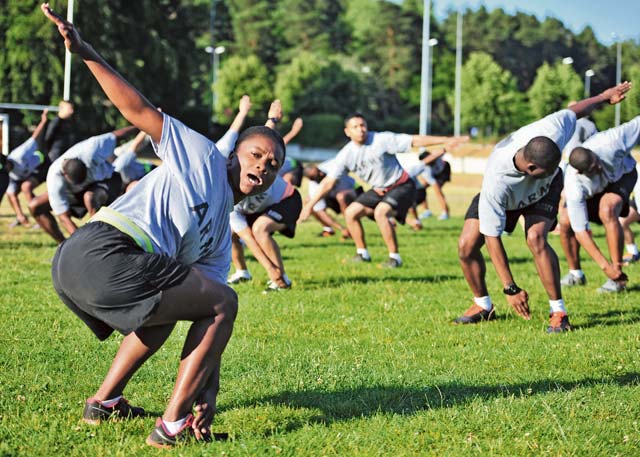
Soldiers from the 21st Theater Sustainment Command and other organizations around Germany received in depth physical readiness training through the Master Fitness Trainer course hosted May 29 to June 26 in the KMC.
A team comprising one Army officer from the Army Training and Doctrine Command and three civilian fitness coaches from Anautics administered the course. The training typically consisted of hands-on physical training in the morning accompanied by classroom instruction in the afternoon. The course explained the entire Army Physical Readiness Training regimen down to the science of each movement, said 1st Lt. Caeson L. Daniell, MFT course team leader.
“In the mornings we focus heavily on the movements and drills from PRT that people have been overlooking in the last few years, focusing on precision, progression and integration, which are the three principles of PRT,” Daniell said. “In the afternoon they learn anatomy, physiology, kinesiology, exercise science and nutrition. It’s a pretty well rounded course.”
Heavy emphasis was placed on executing each exercise within the PRT program with precise motion and timing. Throughout the course, the Soldiers learned when each exercise was necessary and why. Even veterans of Army PRT were surprised to learn they had not been performing the exercises correctly.
“I was a drill sergeant for two years and I thought I was doing PRT right the whole time, but I wasn’t,” said Staff Sgt. Juna C. Cyriaque, personnel NCO assigned to the 21st TSC’s Special Troops Battalion, while performing the “Side Bridge” exercise. “Doing it right is kicking my butt!”
To both the trainers and trainees, the course and its material are considered extremely important. One of the trainers went on to explain why proper implementation of PRT is so crucial.
“The Army has a great program in place with PRT, but it is not being utilized as is should. We want to make sure it is implemented correctly, because as a performance coach having worked with athletes at the collegiate level, we know that when you do performance training it’s all about the specificity of the training to the job we are going to do,” said Alex Z. Hoffman, MFT course instructor from Anautics. “The Army has one of the most important jobs in the world, because they provide for our safety.”


